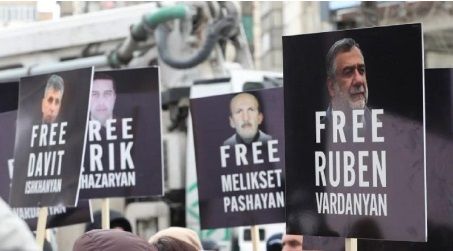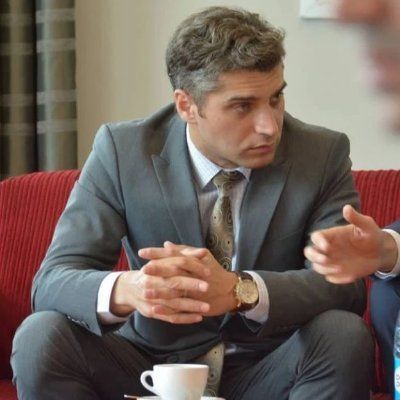Why Armenian diaspora fears peace more than conflict [OPINION]
![Why Armenian diaspora fears peace more than conflict [OPINION]](https://www.azernews.az/media/2025/10/22/0050193874967.png)
For decades, the Armenian diaspora has been one of the most politically active communities in Europe and North America. Yet, rather than using its influence to foster reconciliation in the South Caucasus, it continues to weaponise its networks against peace. While the government in Yerevan publicly speaks of “normalisation” with Azerbaijan, the diaspora’s lobbying circles across Europe and the United States pursue a different goal entirely. This is the resurrection of an irredentist cause that history, law, and reality have already buried.
The most recent example of this came from Amsterdam, where members of the Party of European Socialists, heavily influenced by Armenian lobbyists, issued a declaration demanding the release of war criminals arrested in Azerbaijan for war crimes, crimes against humanity, and even calling for the “return of Armenians to Artsakh.” That single word - Artsakh - exposes the fundamental illegality of their position. It is not an official toponym recognised by any state or international organisation. It is a politically loaded term, deliberately used to challenge Azerbaijan’s territorial integrity and to perpetuate the illusion that an entity independent of Baku ever existed within its sovereign borders.
Such rhetoric is not merely inaccurate; it is dangerous. It undermines the fragile progress achieved since the 2020 and 2023 peace processes and plays directly into the hands of those in Yerevan who still dream of rewriting borders through political manoeuvring. Every call for the “release of prisoners” or the “return to Artsakh” fuels division and delays reconciliation between the two nations that have suffered enough from decades of conflict.

The truth is far less flattering to the lobbyists’ narrative. The so-called “prisoners of war” they refer to are not innocent civilians or political detainees. They are individuals charged with serious crimes under Azerbaijani and international law, including terrorism, murder, torture, and participation in illegal armed groups. Among them is Ruben Vardanyan, a Moscow-based billionaire who briefly styled himself as a “state minister” in the now-defunct separatist administration on Azerbaijani soil. Vardanyan is currently standing trial before the Baku Military Court, where the evidence presented against him includes financing of terrorism, illegal border crossings, and collaboration with foreign intelligence networks.
These are not political accusations; they are legal charges backed by material proof. The very notion that such figures should be “freed” at the behest of a lobby group in Europe is an affront to justice. To call for their release is to dismiss the authority of Azerbaijan’s judiciary, disregard the sovereignty of its territory, and trivialise the suffering of victims of war crimes committed during three decades of Armenian occupation in Garabagh.
To label the prosecution of war criminals as “oppression” is not human rights advocacy, but it is historical revisionism dressed up as activism. Worse still, it amounts to complicity in whitewashing acts that the international community, including the United Nations and the European Court of Human Rights, recognises as violations of international humanitarian law.
The Armenian government, for its part, plays a subtler game. Prime Minister Nikol Pashinyan’s administration has repeatedly shifted its rhetoric depending on the audience and pressure. On the one hand, it claims to recognise Azerbaijan’s territorial integrity and engages in negotiations; on the other, it continues to delay constitutional reforms that would eliminate the preamble referencing “Nagorno-Karabakh” as part of Armenia. That preamble remains a living monument to Armenia’s territorial ambitions, and its removal, initially promised by Yerevan, has become one of the principal sticking points in peace talks.
By refusing to amend its constitution, Armenia sends a clear signal: it wants peace on paper but not in practice. And as long as this ambiguity persists, diaspora groups will exploit it, claiming that Yerevan’s hesitation is a sign of unfinished business rather than a legal obligation. Thus, Armenia’s internal political indecision feeds directly into the diaspora’s external campaigns of misinformation.
The irony is stark. While Armenia’s foreign supporters decry Azerbaijan’s post-conflict policies, it is Baku that has consistently advanced initiatives for regional stability and economic integration. From rebuilding war-torn Garabagh into a modern green energy hub to proposing the opening of communication routes through the Zangazur Corridor, Azerbaijan has demonstrated a commitment to transforming the South Caucasus into a corridor of prosperity rather than a theatre of tension.
Yet Armenia has opposed nearly every such initiative. When the Zangazur Corridor, a transport, infrastructure, and power project (TIPP) designed to connect Azerbaijan with its Nakhchivan exclave and beyond to Türkiye, was proposed, it was welcomed by regional and global partners as a step towards economic interdependence. Only Armenia denounced it as a “disaster for its future.”
But one must ask: what kind of “disaster” does open trade and connectivity bring? Roads, railways, and pipelines do not threaten nations, but isolation and hostility do. The corridor promises to revitalise trade across Eurasia, benefit Armenia’s own industries, and anchor the South Caucasus within the global supply chain. To reject such a project is not an act of patriotism; it is a symptom of political myopia.
Armenia’s persistent obstruction of regional transport and energy links is not driven by legitimate security concerns, but by a deeper fear: that normalisation will strip away the last vestiges of the “Artsakh” myth and expose decades of political manipulation for what it was, an attempt to redraw borders through force and narrative. For many in the diaspora, who have built their identity around the cause of “Artsakh,” acknowledging its end means confronting uncomfortable truths about misplaced loyalties and failed strategies.
In contrast, Azerbaijan has emerged as the region’s stabilising actor. Through active diplomacy, infrastructure investment, and its proposals for mutually beneficial economic relations, Baku is offering a pragmatic path forward. Its focus on reconstruction and reintegration stands in sharp contrast to the rhetoric of revenge that continues to echo from diaspora circles abroad.
The peace process in the South Caucasus is not a zero-sum game. It does not demand that Armenia lose so that Azerbaijan wins. It demands that both nations, and their global supporters, accept the realities established by international law and confirmed by history. Yet, every resolution adopted by diaspora groups that romanticises “Artsakh” or defends convicted war criminals pushes genuine peace further out of reach.
If the Armenian diaspora truly cares about Armenia’s future, it must stop fighting yesterday’s battles. Instead of financing lobbying efforts that alienate neighbours and insult victims, it should channel its considerable resources into rebuilding Armenia’s economy, supporting democratic reform, and fostering coexistence. For as long as the diaspora continues to act as the loudest voice of denialism, Armenia will remain trapped between nostalgia and necessity.
Peace in the South Caucasus is achievable. It requires courage, honesty, and above all, consistency, values that Azerbaijan has demonstrated in both policy and practice. The challenge now lies with Yerevan and those abroad who claim to speak in its name. They must decide whether they want to be agents of reconciliation or relics of a failed past.
Here we are to serve you with news right now. It does not cost much, but worth your attention.
Choose to support open, independent, quality journalism and subscribe on a monthly basis.
By subscribing to our online newspaper, you can have full digital access to all news, analysis, and much more.
You can also follow AzerNEWS on Twitter @AzerNewsAz or Facebook @AzerNewsNewspaper
Thank you!

